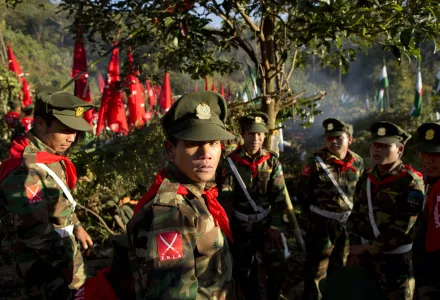International Security is America's leading peer-reviewed journal of security affairs.

Peacekeeping is helpful in resolving civil wars, but many conflicts have little chance of peacekeeping operations or other international peace-building interventions. Examination of relationships between armed groups and governments in much of post-colonial South Asia demonstrates how internal wars stabilize without meaningful international involvement. Two key factors, the government’s political space for bargaining and the relative power of armed groups, help to explain when it is possible to reach either stable cooperation between states and armed groups or negotiated settlements.
Basil Bastaki, Paul Staniland, and Bryan Popoola, "Stabilizing Civil Wars without Peacekeeping: Evidence from South Asia," International Security, Vol. 49, No. 1 (Summer 2024), pp. 133–170.
The full text of this publication is available via International Security.





